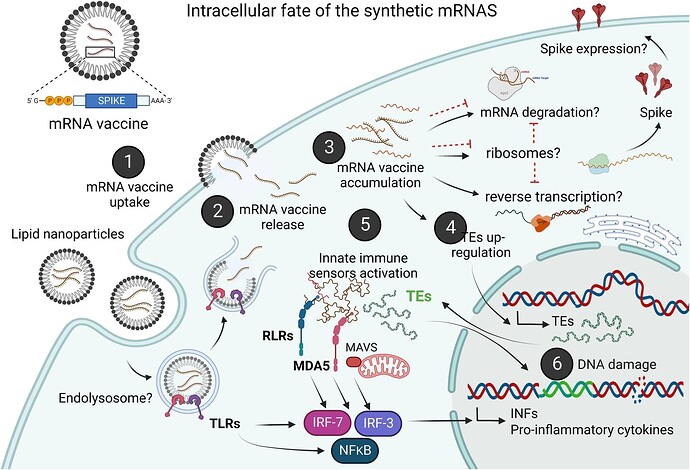Their theory is a lot to explain so I’ll just stick with an oversimplified version.
The dumbed down version is this:
- Some people are susceptible to health problems because their cells can’t clear the vaccine’s mRNA.
- The mRNA’s effect sticks around for a while- perhaps for more than 60 days.
- What sticks around causes the production of interferons (INFs in the diagram) and pro-inflammatory cytokines.
- That leads to DNA damage, which raises the possibility of cancer as a side effect.
- The production of interferons and pro-inflammatory cytokines from #2 causes a persistent inflammatory state. That inflammation, “if unregulated, leads to autoinflammatory and autoimmune conditions”.
- The bottom line: “Susceptible individuals would then expectedly have an increased risk of DNA damage, chronic autoinflammation, autoimmunity and cancer.”
Myocarditis
The authors believe that TREX1 deficiencies could explain myocarditis in human, like how TREX1 deficiencies lead to myocarditis in mice.
One way that TREX1 deficiencies can occur is if you have a gene mutation that causes your TREX1 pathway to be less effective. Genetic studies can help us figure out whether or not that’s true.
Practical applications?
I’m probably a little small brained but I don’t think this has any implications for treatment yet.
Presentation and scientific paper
Acevedo-Whitehouse’s presentation at WCH is brought down to a level that’s easy to understand for a general audience.
Their hypothesis paper is… really really really high-level across multiple topics (mRNA, pattern recognition receptors, cancer). The lead author is a polymath in multiple fields so that paper is a little daunting because you would need to know multiple topics at a high level.
